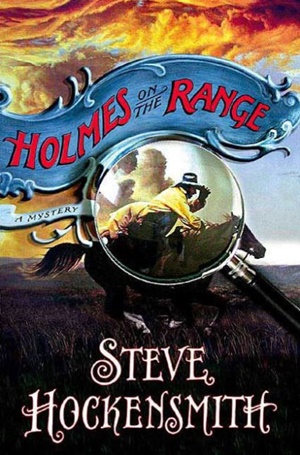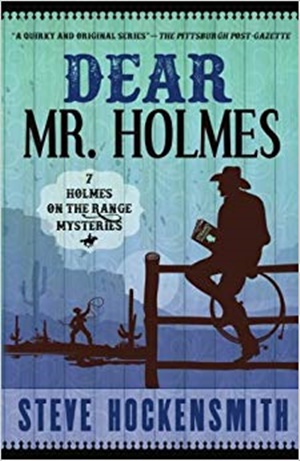The Public Life of Sherlock Holmes: Holmes on the Range
 That’s right: The Public Life of Sherlock Holmes is back! Well, for one week, anyways. A (Black) Gat in the Hand will resume next Monday. There were quite a few topics I never got around to covering during TPLoSH’ 156-ish week run. (Wow!) And one was Steve Hockensmith’s Holmes on the Range series. I recently got around to finishing the short story collection that I bought for my Nook back in 2011 (I’ve got a bit of a reading backlog, ok?!), and I decided I needed to finally write a post about it, before it got buried in the To Write list again. So, here we go!
That’s right: The Public Life of Sherlock Holmes is back! Well, for one week, anyways. A (Black) Gat in the Hand will resume next Monday. There were quite a few topics I never got around to covering during TPLoSH’ 156-ish week run. (Wow!) And one was Steve Hockensmith’s Holmes on the Range series. I recently got around to finishing the short story collection that I bought for my Nook back in 2011 (I’ve got a bit of a reading backlog, ok?!), and I decided I needed to finally write a post about it, before it got buried in the To Write list again. So, here we go!
There are a lot of ways to go about writing a Sherlock Holmes story. Some folks attempt to very carefully emulate Sir Arthur Conan Doyle’s own style, and turn out a tale that feels as if it might have been done by the creator of the great detective himself. Of course, success varies greatly. Hugh Ashton and Denis O. Smith are the best I’ve found in this regard. You can find stories ranging from pretty good to not suitable for (digital) toilet paper. I’ve had three of my own stories published with ‘meh’ results.
Some folks write whatever the heck they want, often with the name of Holmes being the only similarity to the famed detective. It is possible to find good Holmes stories that sound nothing like Dr. Watson’s narrative style, of course. And Holmes has been placed in different eras, and even worlds.
There have been Holmes parodies around for over a hundred years. I’ve written a couple myself, and they were fun!
There are Holmes-like successors out there, of whom August Derleth’s Solar Pons is the best. Yes, I’m aware that’s a subjective judgement, but it’s mine, and I’m the one writing this essay, so it stands. I’ve written about Pons more than once (here’s a good overview), and even contributed introductions and pastiches to anthologies.
But today I’m going to talk about one of Sherlock Holmes’ contemporaries; albeit, quite different and far away. Steve Hockensmith had been writing short stories for Ellery Queen’s Mystery Magazine Christmas issue, and wanted to sell more to the venerable magazine. EQMM does an annual Sherlock Holmes issue, so he figured that was the way to go. But he wanted to write more than just another Holmes story.
While out hiking in the nature of California, his muse spoke to him: cowboys, in the Old West, influenced by Sherlock Holmes. And so were born brothers Gustav (Old Red), and Otto (Big Red) Amlingmeyer. They are flame-haired, cattle-drive cowboys. Younger brother Otto’s sixth grade education makes him the reader of the family, while the quiet Otto is the smarter of the two.
“Dear Mr. Holmes” was the first of seven short stories about the deducifyin’ cowboys. There have been five novels as well, of which I’ve read the first four. The Double-A Western Detective Agency is on my To Be Read shelf, clamoring for attention among the dozens of other books there. Book number three, The Black Dove, didn’t quite work for me, but otherwise, I’m a huge fan of the Holmes on the Range series – long and short form. I’ve really enjoyed it.
Each story is in the form of a letter from Otto to someone (a publisher, Dr. Watson…), recounting one of their adventures, in which Gustave tries to apply Holmes’ methods. In the first, it’s to Holmes himself, care of The Strand Magazine. Otto reveals that while on a cattle drive, another cowboy gave him a magazine he had found and kept for the brothers. It contained a story called “The Red-Headed League.” As Otto recounts:
“The title alone got a chuckle out of me. I read it out loud for Gustav (who can’t tell his As from his Zs or anything in between), but he just grunted. The boys around the fire got a fine laugh from it though, and they called out for me to read the whole story. Now along the trail I’ve got a reputation for oratory and poetry reciting and song singing and such, being under-blessed on modesty and powerful over-blessed on lung power. So I grabbed a lantern off the commissary and cleared my throat and gave the fellows a regular night at the theatre.
Well, you’ll have to tell that Dr. Watson he’s a top-rail yarn spinner. The boys ate it up like it was hot doughnuts on Christmas morning. They were hooting and joshing me and Gustav fierce when they heard that burro milk about the locoed American tycoon giving away money to redheads. Not a one of them figured out it was just a bad man’s scheme, and when you caught the rascal red-handed (so to speak) trying to dig his way into a bank they cheered and clapped like you were right there with us doing back-flips.
Now usually the flannel-mouthed whopper-swapping you’ll hear around a cowboy campfire puts my brother straight to sleep. And for a minute or two I thought “The Red-Headed League” would be just another lullaby as far as he was concerned. But when I got to the part where you told that pawnbroker everything there was to know about himself—where he’d been and what he’d done and who he was, just from looking at him—Gustav perked up right smart. His eyes got all wide in a way I’d never seen, picking up the light from the fire and glowing like the big eyes of a hoot owl.
But though he was staring straight at me, I knew he didn’t see me or the campfire or the boys gathered around it. What he saw was you and Dr. Watson and that pawnbroker and everything else in the story. When I finished he even applauded along with the rest of the boys, which was peculiar indeed since a show of enthusiasm from Gustav is about as common as a six-legged mule or an honest bartender.
That dreamy-like look stayed on Old Red’s face all the next day. And when we were gathered around the fire that night, he asked me to read the story again.”
And so, in every story, there is some mystery to solve and Gustav tries to apply Holmes’ methods, with Otto alongside. The setting and vernacular are very much the Old West – quite distinctive from Baker Street and Victorian London. While Dr. Watson is something of a lapdog to Holmes, Otto speaks his peace; though, he almost always bows to his older brother’s wishes.
It’s a clever twist, with the brothers believing that Holmes and Watson are real people (in fact, they are for purposes of these books). And while the stories are from that venerable pulp and paperbacks mainstay, westerns, bits of Holmes’ wisdom and methods are incorporated into each one, with Gustav the only character on the right path.
“Alright, then,” I said. “Let’s find something to focus on in here.” I made a quick study of the passengers in our line of sight. “Four rows up, other side of the car, on the aisle, facing us.”
Old Red took all of a second to size up the man I was singling out—a young drover about my own age.
“Feh,” he said. “You wanna distract me with some Holmesin’, you gotta throw me more of a challenge that that.”
“Really?” I shrugged. “Prove it.”
My brother shook his head and sighed . . . then reeled out his deducifications all the same.
“Feet, face and hands—that’s what tells the story of a man, no matter the duds he’s sportin’. And that feller’s feet, face and hands don’t just tell the story. They shout it. Why, even from here I can see he ain’t got dirt under his nails. And he fancies himself a cowboy, but he ain’t got the tan you’d find on a soda jerk. His boots ain’t got no crease nor fade, and they’re big ol’ things, too—for a flat-footed feller who’s walked everywhere his whole life ‘stead of ridin’ there in a saddle. And his hat’s still stiff and clean.
Ain’t never been rained on or used to hold water or oats for a horse. Naw, right there you got a city boy who’s got his head filled up with Buffalo Bill bull. He’s runnin’ off to try his hand at punchin’ somewhere on the Plains, only he don’t even know this is the worst time of year to do it.
Fall round-ups’ll be over by the time he even makes it to a ranch. His mother—she’s a left-handed Irish-born charwoman, by the by—she tried to stop him, but . . . . ”
My brother cut himself off with another grunted “Feh” and a dismissive swipe of the hand.
“It deduces itself.”
“Now, as a lot, conductors aren’t overly fond of cowboys, my former profession tending toward young rowdies ill equipped for long stretches cooped up in what is basically a bunkhouse on wheels. And though I was sporting my fine new Frisco-bought suit, Old Red still insisted on dressing like a dollar-a-day ranch hand. Which might explain why the conductor was grimacing at Gustav like a vulture circling something so yuck-ugly even it wouldn’t swoop in for a taste.
“That’s not my problem,” the man sneered.Regrettable sartorial choices aside, of course, Gustav and I had been taking pains not to draw attention to ourselves. So I might not have put up an argument but for two things. Firstly, it was dusk, and after a few more minutes of “The Musgrave Ritual” the snow-topped peaks and yawning chasms passing by the windows would be safely swallowed by darkness—and the few crumbs my brother had swallowed that day would have a better chance of staying swallowed, Holmes or no.And secondly . . . well, the conductor was a high-handed S.O.B., and it just plain got on my nerves.”
Dear Mr. Holmes: Seven Holmes on the Range Mysteries is the short story collection. There are six stories that appeared in Ellery Queen Mystery Magazine between 2003 and 2008. There’s also one story from the Ghost Towns anthology (2010).
 I read the novels before the short stories, but I don’t think it really matters which order you come across them.
I read the novels before the short stories, but I don’t think it really matters which order you come across them.
Holmes on the Range is the first novel and it’s a great introduction to the series. The brothers come across a dead body that looks like the victim of a cattle stampede. But it’s a good thing Gustav is a fan of Sherlock Holmes.
On the Wrong Track has the boys working as guards for the Southern Pacific Railroad (which Gustav hates with a passion) and I think it’s probably my favorite in the series.
The Black Dove is set mostly in pre-Earthquake San Francisco’s Chinatown. I recall not being particularly happy with the ending of this one. It’s still definitely worth reading, though.
The Crack in the Lens has the brothers in San Marcos, Texas, where Gustav works on solving the murder of his former lover – a prostitute. I like the digging into Old Red’s past, and the depth of the mystery to be solved. Otto has found a publisher, like Dr. Watson with The Strand, which is a neat bit.
The World’s Greatest Sleuth sends the brothers to the World’s Columbian Exposition – the mega-fair being held in Chicago. They are there to compete against other top-flight detectives to succeed Holmes as ‘The World’s Greatest Detective.’ This is a fun one.
Hockensmith took a break from the series after this book – writing a couple other series.’ He decided to revive Old Red and Big Red and self-publish a new entry in the series. Which was:
The Double-A Western Detective Agency sees the boys finally in business as professional detectives! I’m looking forward to reading this one.
Along with Will Thomas’ excellent Barker and Llewelyn novels, this one is my favorite Holmes/not Holmes series. I’ve enjoyed every novel (don’t read too much into The Black Dove being my least favorite in the series. It’s still good) and the short story collection was enjoyable.
Hockensmith has created the ‘Cowboy Holmes’ pastiche, without Holmes himself. And he’s done it very well. I hope there will be more installments in the series.
I will also add that all five novels are currently part of Kindle Unlimited. So, if you are part of that monthly Amazon program, you can read the ebooks for free (the monthly fee is a sunk cost, right?).
 Bob Byrne’s ‘A (Black) Gat in the Hand’ was a regular Monday morning hardboiled pulp column from May through December, 2018 and was brought back in the summer of 2019.
Bob Byrne’s ‘A (Black) Gat in the Hand’ was a regular Monday morning hardboiled pulp column from May through December, 2018 and was brought back in the summer of 2019.
His ‘The Public Life of Sherlock Holmes’ column ran every Monday morning at Black Gate from March, 2014 through March, 2017 (still making an occasional return appearance!).
He organized ‘Hither Came Conan,’ as well as Black Gate’s award-nominated ‘Discovering Robert E. Howard’ series.
He is a member of the Praed Street Irregulars, founded www.SolarPons.com (the only website dedicated to the ‘Sherlock Holmes of Praed Street’) and blogs about Holmes and other mystery matters at Almost Holmes.
He has contributed stories to The MX Book of New Sherlock Holmes Stories – Parts III, IV, V and VI.
And he contributed to The New Adventures of Solar Pons.